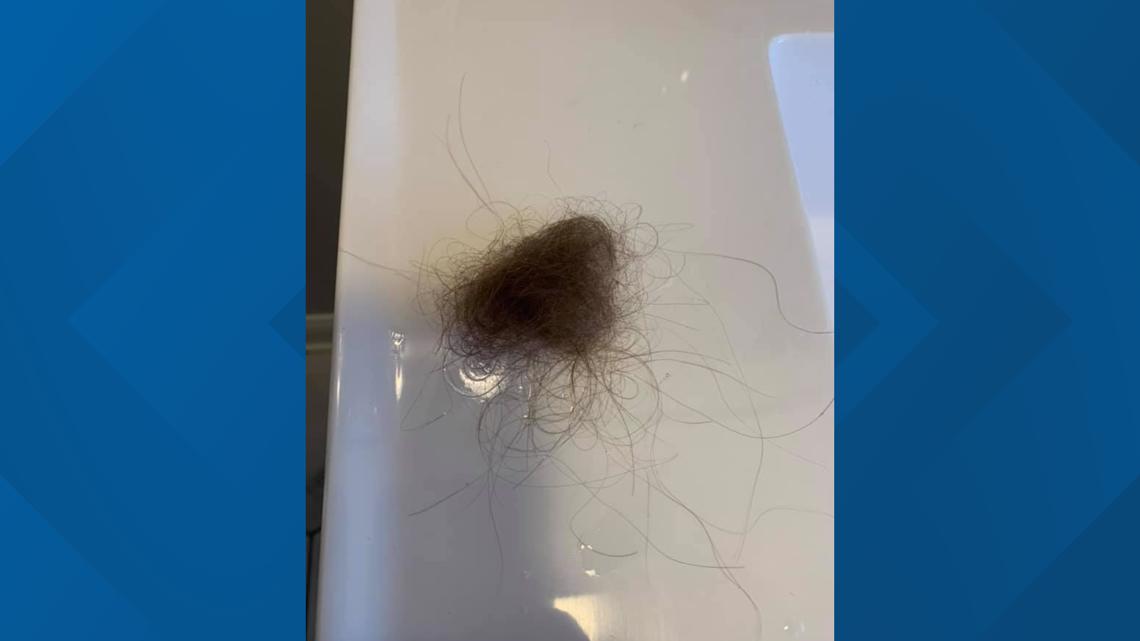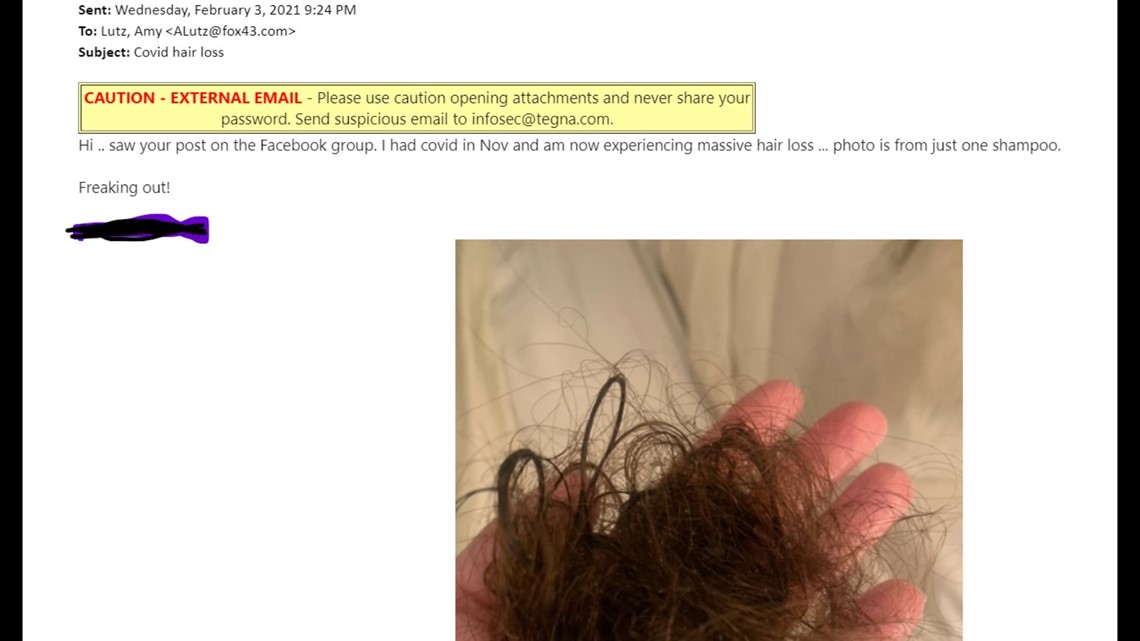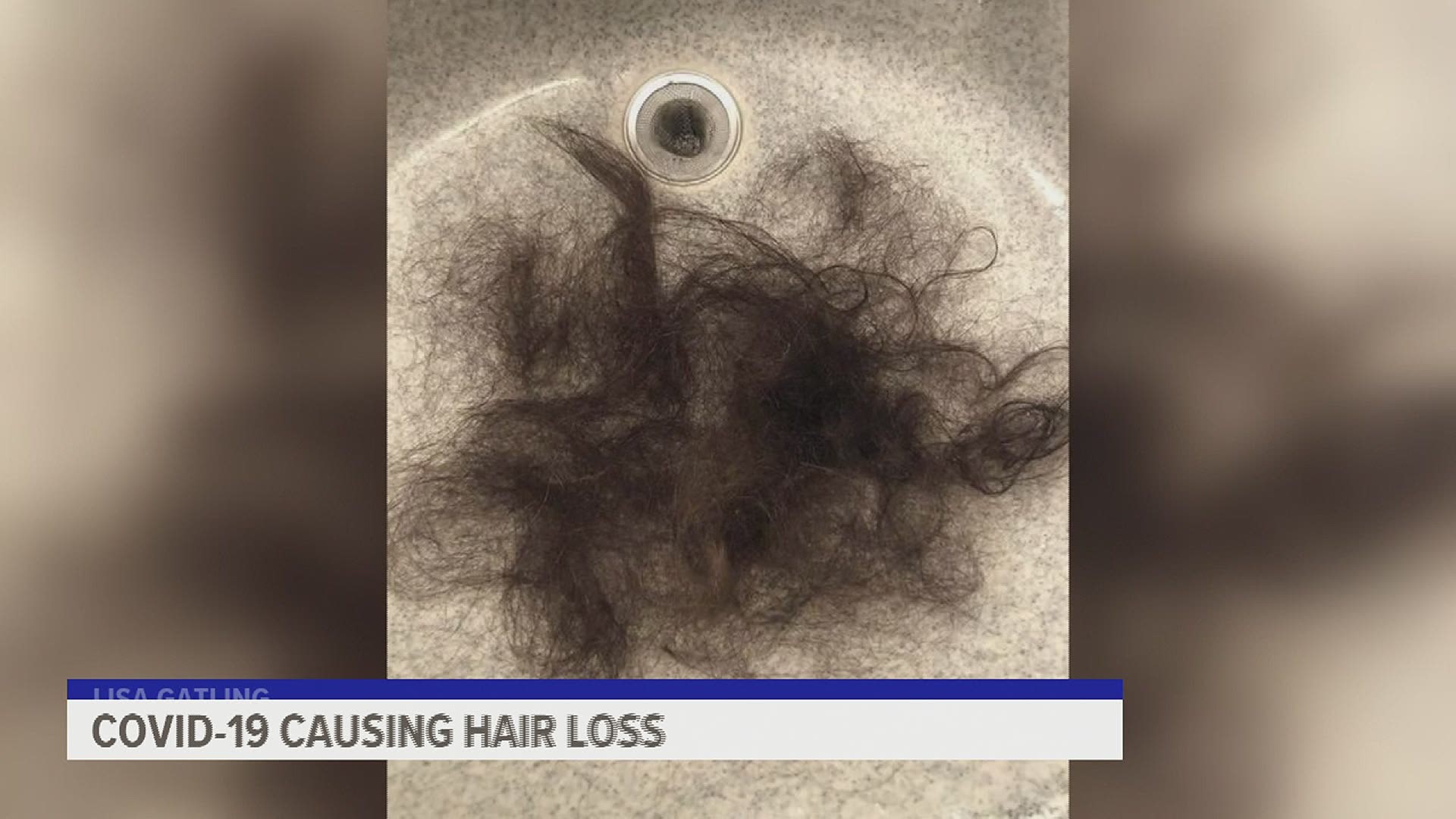YORK, Pa. — One thing we’ve learned the past year with COVID-19, is that it seems to affect everyone differently. The Centers for Disease Control and Prevention says long-term effects of the virus include fatigue and shortness of breath.
However, more medical experts are starting to see something that affects people’s physical appearance: hair loss. So FOX43 looked into why this is happening, and what to do if it happens to you.
Lisa Gatling of York County said she got sick with COVID last July. In September, she noticed her hair was starting to shed.
"I have thick hair, it never falls out.... and it wasn't little pieces, it was long clumps of strands," she said. "Your hair is just like your crown you know, and when you start to think, oh my god am I gonna go bald?"


She isn't alone. FOX43 got this e-mail and photo below from a viewer, saying, "I had covid in Nov and am now experiencing massive hair loss .... Freaking out!"


So before you too freak out, let's first find out why this is happening. For that, we asked Wellspan Dermatologist Dr. Patricia Oyetakin.
It's a condition called telogen effluvium where essentially what happens is a major illness stressor or event just shocks the body to the point where the hair follicles are off cycle, " she said.
Put simply, it's when more hairs than normal enter the shedding phase of the growth cycle at the same time. Most people start to see their hair fall out in clumps 2 to 3 months after being very sick, especially if they had a fever. "We are seeing a record number of cases than we usually see during this time," Dr. Oyetakin said.
However, COVID-19 isn't the only root of the problem, add stress to the list.
"I think we can all agree that stress levels are a little bit elevated in this pandemic and stress leads to TF," she said.
There are many ways to lower stress and she says there are also several topical and oral medications that can help. Many people instead opt to conceal the problem, with a wig. However, hair loss has become so common the past year that one wig maker we talked to said they can't keep up with the demand because of a huge hair shortage. "We have the regular population of people who usually use hair wigs and camouflage such as the cancer patients and now we're adding a new population of people who either have recovered from the COVID-19 infection or again are dealing with this pandemic-related stress."
In some cases, it can take up to 9 months before the hair shedding stops, but most people we talked to said theirs stopped after a few months.
Lisa's hair is starting to grow back and she said she welcomes the tiny pieces of hair everywhere, because that means it's coming back. Dr.Oyetakin says time is really your best medicine, because it will eventually reset your hair follicles and grow back. She also said that it is always best to be proactive. If you experience any type of hair loss, see a dermatologist as soon as possible.
You can search for a list of WELLSPAN Physicians by clicking: here.
For more information about hair shedding and other conditions that cause hair loss, check out the American Academy of Dermatology.
STRESS MANAGEMENT:
Stress can further the problem, so it definitely helps to try to lower your levels. The American Psychological Association offers 5 quick, action-oriented things you can do to help manage excessive stress during COVID-19 and the science behind them, here.
The Centers for Disease Control and Prevention also offers these healthy ways to cope with COVID-19 stress:
- Take breaks from watching, reading, or listening to news stories, including those on social media. It’s good to be informed, but hearing about the pandemic constantly can be upsetting. Consider limiting news to just a couple times a day and disconnecting from phone, tv, and computer screens for a while.
- Take care of your body.
- Take deep breaths, stretch, or meditate.
- Try to eat healthy, well-balanced meals.
- Exercise regularly.
- Get plenty of sleep.
- Avoid excessive alcohol, tobacco, and substance use.
- Continue with routine preventive measures (such as vaccinations, cancer screenings, etc.) as recommended by your healthcare provider.
- Get vaccinated with a COVID-19 vaccine when available.
- Make time to unwind. Try to do some other activities you enjoy.
- Connect with others. Talk with people you trust about your concerns and how you are feeling.
- Connect with your community- or faith-based organizations. While social distancing measures are in place, try connecting online, through social media, or by phone or mail.


